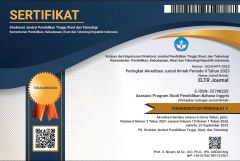INVESTIGATING STUDENTS’ ONLINE LEARNING EXPERIENCE USING REVISED COMMUNITY OF INQUIRY FRAMEWORK IN AN EFL WRITING COURSE
Abstrak terlihat: 552 / PDF terunduh: 532DOI:
https://doi.org/10.37147/eltr.v6i1.124Keywords:
Community of Inquiry, online learningAbstract
Quality online programs often demonstrate significant teaching presence, social presence, cognitive presence, learner presence with the help of technology use. This study investigates online learning experience based on the Revised Community of Inquiry (RCoI) framework in a writing course. The goal of this study is to explore how asynchronous and synchronous activities in an LMS can be utilized to create higher levels of cognitive presence in the online environment. Learning experience of one writing course consisting 28 students were assessed through questionnaire & FGD. Hopefully, the result of this study will contribute to the more accessible, convenient, and effective online learning in the future.
Downloads
References
Garrison, D. R., & Arbaugh, J. B. Researching the community of inquiry framework: Review, issues, and future directions. The Internet and Higher Education, Vol. 10, 2007, pp. 157-172.
Garrison, D. R., Anderson, T., & Archer, W. (1999). Critical inquiry in a text-based environment: Computer conferencing in higher education. The internet and higher education, 2(2-3), 87-105.
Kim, M. K., Kim, S. M., Khera, O., & Getman, J. (2014). The experience of three flipped classrooms in an urban university: an exploration of design principles. The Internet and Higher Education, 22, 37-50.
Shea, P., & Bidjerano, T. (2010). Learning presence: Towards a theory of self- efficacy, self-regulation, and the development of a communities of inquiry in online and blended learning environments. Computers & Education, 55(4), 1721-1731.
Swan, K., Matthews, D., Bogle, L., Boles, E., & Day, S. (2012). Linking online course design and implementation to learning outcomes: A design experiment. The Internet and Higher Education, 15(2), 81-88.
Wilson, B. 1990. The preparedness of teacher trainees for computer utilisation: the Australian and British experiences. Journal of Education for Teaching 16. 161- 171.
Wulandari, (2013). Moodle-based Learning Model for Paragraph Writing Class. Unpublished Thesis. Yogyakarta: Universitas Sanata Dharma
Warschauer, M. (1996). Comparing face-to-face and electronic communication in the second language classroom. CALICO Journal, 13. 2, 7–26.
Downloads
Published
How to Cite
Issue
Section
License
Copyright (c) 2022 Mega Wulandari

This work is licensed under a Creative Commons Attribution-ShareAlike 4.0 International License.











 ELTR Journal,
ELTR Journal, 